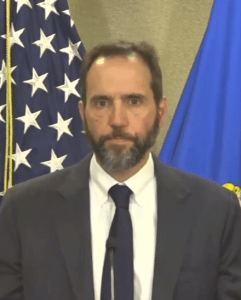 University of Maryland President Darryll Pines has joined the ignoble line of educators and administrators enabling the growing anti-free speech movement on our campuses. Pines has defended the shouting down of Rep. Jamie Raskin (D., Md). as exercising free speech as hecklers. He is dead wrong and the Board of Directors should address his inimical view of free speech in higher education. As for Raskin, it is an ironic but telling moment from a member of Congress who has supported censorship and consistently opposed efforts to investigate the silencing of those with opposing views.
University of Maryland President Darryll Pines has joined the ignoble line of educators and administrators enabling the growing anti-free speech movement on our campuses. Pines has defended the shouting down of Rep. Jamie Raskin (D., Md). as exercising free speech as hecklers. He is dead wrong and the Board of Directors should address his inimical view of free speech in higher education. As for Raskin, it is an ironic but telling moment from a member of Congress who has supported censorship and consistently opposed efforts to investigate the silencing of those with opposing views.
I have been highly critical of Rep. Raskin on a number of issues, particularly his efforts to thwart investigations into censorship.
Pines terminated the event after protesters repeatedly interrupted his speach as the Irving and Renee Milchberg Endowed Lecture, titled “Democracy, Autocracy and the Threat to Reason in the 21st Century.”
According to the Maryland Reporter, the protesters accused the Jewish legislator of being “complicit in genocide” and rebuffed his efforts to engage them in a dialogue on the issue. After efforts to resume his remarks, Pines finally ended the event early.
Rather than protect the right of Raskin to speak and others to hear his views, Pines offered only a mild criticism of the protesters as needing to be more civil but then insisted “what you saw play out actually was democracy and free speech and academic freedom.” He added that, “from our perspective as a university, these are the difficult conversations that we should be having.”
No it is not as difficult as you suggest. These protesters stopped the free exchange of ideas in a university event. They prevented opposing views from being spoken or heard. In so doing, they blocked the critical condition needed for higher education in allowing an exchange of ideas. Heckling is an effort to stop discussion, not to engage in discussion.
Clearly, the “difficult conversation” for Pines is to enforce university policies and protections for free speech. It takes courage and principle. It requires administrators to have the commitment to suspend or expel students who disrupt classes or events. They have every right to protest outside or to ask difficult questions. They do not have a right to prevent speech.
As for Raskin, he is now the victim of the anti-free speech movement that he has helped fuel in Congress. In my forthcoming book, The Indispensable Right: Free Speech in an Age of Rage, I discuss this pattern as the anti-free speech movement turns on politicians and professors who once supported them. Others spent years in conspicuous silence as others were targeted, but now have grown alarmed as their own views are declared “harmful” and “triggering.”
As discussed today in relation to a controversy at Tulane, universities continue enable this movement by failing to enforce policies at events or refusing to punish those responsible. Pines is not alone in his view that this is just an exercise of free speech. Academics and deans have said that there is no free speech protection for offensive or “disingenuous” speech. CUNY Law Dean Mary Lu Bilek showed how far this trend has gone. When conservative law professor Josh Blackman was stopped from speaking about “the importance of free speech,” Bilek insisted that disrupting the speech on free speech was free speech.
In the incident last year of a federal judge being shouted down at Stanford Law School, Dean Jenny Martinez later apologized and then released a letter with Stanford President Marc Tessier-Lavigne that reaffirmed the commitment to free speech, but did not commit to holding the students accountable for their disruption.
Dean Martinez later issued another letter with a strong defense of free speech and declared that all students (including the victims of the disruption) would be required to attend a free speech appreciation session. However, she declined any action against the students responsible for the disruption. That is a familiar pattern at universities.
The question is whether the Board of Regents for the Maryland system will call Pines to account for his view of free speech.




